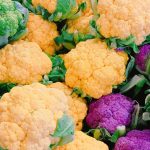I hear this a lot – “I don’t eat organic because it’s too expensive.” Yeah, I get it – it is more expensive. For those of us on a tight budget (myself included), it can be hard to justify buying organic produce that looks the same as its organic counterpart. Organic food is more expensive because organic farming is more labor intensive, organic feed for livestock is more expensive, and organic certification is costly and takes time.
Consider this: non-organic produce, dairy, and meat contain pesticides, antibiotics and hormones. Pesticides are toxic to weeds, insects and rodents. Hormones encourage unnatural weight gain in animals, and antibiotics wipe out the good bacteria animals (and humans) need for healthy digestion and so much more. There’s truth to the saying “you are what you eat.” Eating non-organic food means we are consuming the pesticides, hormones and antibiotics. Even if they are in small amounts, these substances can accumulate in our bodies over time, adding to what is called the toxic burden and interfering with the body’s natural ability to detoxify itself.
Let’s go back to the high price tag of organic food. You could think of buying organic as an investment in your health. If you minimize your toxic burden, you are keeping your system clean and clear so that it can function more efficiently. This means less risk for illness and chronic disease down the line, which saves you money on prescriptions, doctor visits, and hospital stays. Eating organic can keep hormones in check, help your liver function more optimally, and may also improve reproductive health and the health of your offspring.
What Does Organic Mean?
There are so many labels and words to keep track of that it can get really confusing about what to buy! Natural, organic, non-GMO, oh my! Organic products are made without preservatives, food coloring, monosodium glutamate (MSG), or artificial sweeteners. Organic produce means the crops were grown with natural fertilizers and were not sprayed with pesticides or chemicals. And organic meat means the animals were not pumped with antibiotics or hormones, nor were they raised on non-organic feed.
“Natural” does not equal “organic.” And even within the term organic, there are different meanings. 100% organic is completely organic, while “organic” means it is 95% organic, and “certified transitional” means it is in the process of becoming organic (which takes 3 years).
“Organic” does equal non-GMO! By buying organic, you can rest easy knowing that your food is not genetically modified (a whole other discussion which I will write about in a future post!).
Organic is good for the environment because it keeps our soil, air, and groundwater cleaner. So as you can imagine, it also keeps our bodies cleaner and some studies show that it may also provide higher amounts of nutrients.
What Does the Research Say About Organic?
Many studies state that organic produce actually has a better nutritional profile, containing more iron, magnesium, phosphorus, carotenoids, antioxidants, omega-3 and omega-6 fatty acids than non-organic (1,2,3).
Furthermore, eating organic can improve our reproductive health. Pesticide exposure has been linked to impaired cognitive development, impaired fetal growth, increased risk for testicular cancer, and increased risk for childhood cancer. In a 2005 study of chemicals in umbilical cord blood, 287 total toxins were detected in the cord blood of 10 newborn babies, 208 of which are linked to birth defects and 180 of which are known to cause cancer (4).
In an April 2012 review by David C. Bellinger, a Harvard professor of neurology, he argues that even if eating organic does have a very small impact on neurodevelopment, it can add up to significant impacts on the population level. He wrote, “It is frequently noted that a modest downward shift in mean IQ scores will be accompanied by a substantial increase in the percentage of individuals with extremely low scores (5).”
The Bottom Line
In my own humble opinion, eating organic is worth the price. It keeps our detoxification systems running smoothly and thus our bodies functioning more effectively. It helps with reproductive health and minimizes risk to the developing fetus. It keeps our air purer and our soil cleaner.
Here are some tips to help cut the costs of buying organic:
- Buy what’s in season. The price of produce goes up significantly when not in season. Pro-tip: Stock up on berries when they are in season and then freeze a batch of them to enjoy during the off-season.
- Buy local – shop at your local farmer’s market.
- Be selective about what you buy organic. If you can’t make the switch completely, buy a mix of organic and conventional produce. Download the Dirty Dozen app to see which fruits and veggies you should always buy organic. Those with a thicker peel tend to have less pesticides once the peel is discarded.
- Wash fruits and vegetables thoroughly before eating to reduce pesticides and chemicals. Toss the outer leaves of leafy veggies to reduce contaminants.
- Cleanse regularly. Under the guidance of an experienced nutritionist or naturopath, cleansing once or twice a year helps clean up the gunk and reduce your toxic burden.
Always remember, you are worth the investment in your health! If you would like more support on going organic or would like to receive guidance on cleansing, please feel free to contact me. I’d love to be a part of your health journey!




